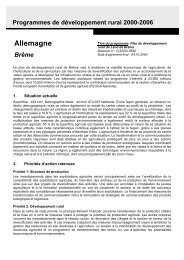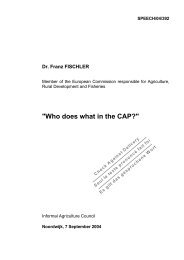B2B Internet Trading Platforms - EDIS
B2B Internet Trading Platforms - EDIS
B2B Internet Trading Platforms - EDIS
Create successful ePaper yourself
Turn your PDF publications into a flip-book with our unique Google optimized e-Paper software.
and conditions of the contract 17 . In other cases, such requirements are not mandatory, in the sense that<br />
the Directive allows business partners to deviate from them by making a different agreement, e.g. for<br />
the provision of information on the different steps for the conclusion of the contract 18 , legal rules on<br />
the placing of the order 19 etc.<br />
A harmonised legal framework for electronic transactions, by lowering barriers to market access and<br />
enhanced transparency, is likely to increase trust in cross-border transactions and consequently to<br />
increase cross-border trade. It must be underlined that the existence of clear and established<br />
competition rules acts as a facilitator, creates trust and ensures that dominant enterprises can not abuse<br />
their position vis-à-vis suppliers or customers infringing Art. 82 EC or that enterprises enter into<br />
agreements contrary to Art. 81 EC.<br />
Competition rules are important to ensure undistorted competition in <strong>B2B</strong> e-marketplaces. Such e-<br />
marketplaces may create a network effect because the value of an electronic exchange increases with<br />
the number of users. This may lead to market ‘tipping’ and the creation of a dominant position if the<br />
network effects are strong enough to induce all market participants to use the same network. This<br />
problem could in particular arise in the context of sector specific e-market places, if most buyers and<br />
suppliers are linked to the same system.<br />
There is the concern of buyers or sellers that sensitive information on prices and quantities may be<br />
exchanged in an uncontrolled manner, thus leading to anti-competitive agreements on prices or other<br />
terms and conditions of the contract. Furthermore, there are fears that the participants in an electronic<br />
market can effectively bundle purchasing or selling volumes. If this is the case, a competition concern<br />
could arise if they were able to co-ordinate their behaviour as buyers or as sellers.<br />
Finally, the ownership of e-marketplaces and the rules governing them may raise concerns. These<br />
rules could be used, for instance, to exclude certain participants from the most efficient e-marketplace,<br />
thus putting them at a competitive disadvantage. In other cases, companies, in particular SMEs, may<br />
be forced by dominant enterprises to use specific e-marketplaces in order to continue to transact with<br />
their business partners. An issue of discrimination could arise if certain market participants (e.g. the<br />
founders) were to receive privileged information about transactions in the market. To deal with this<br />
issue, certain market places are setting up “Chinese walls” to impede any information flows between<br />
the parent companies and the joint venture.<br />
16<br />
17<br />
18<br />
19<br />
supervisory authority … (f) where the service provider undertakes an activity that is subject to VAT, the<br />
identification number referred to in Article 22.1 of the sixth Council Directive 77/388/EEC<br />
“Article 5.2: “Where information society services refer to prices these are to be indicated clearly and<br />
unambiguously and, in particular, must indicate whether they are inclusive of tax and delivery costs”.<br />
Article 10.3 : “Contract terms and general conditions provided to the recipient must be made available<br />
in a way that allows him to store and reproduce them”.<br />
Article 10.1: “Member States shall ensure, except than otherwise agreed by parties who are not<br />
consumers, that at least the following information is given by the service provider clearly,<br />
comprehensible and unambiguously and prior to the order being place by the recipient of the service:<br />
(a) the different technical steps to follow to conclude the contract; (b)whether or not the concluded<br />
contract will be filled by the service provider and whether it will be accessible; (c) the different<br />
technical means for identifying and correcting input errors prior to the placing of the order; (d) the<br />
languages offered for the conclusion of the contract<br />
Article 11.1: “Member States shall ensure, except than otherwise agreed by parties who are not<br />
consumers, that in cases where the recipient of the service places his order through technological<br />
means, the following principles apply: (a)the service provider has to acknowledge the receipt of the<br />
recipient’s order without undue delay and by electronic means; (b) the order and the acknowledgement<br />
of receipt are deemed to be received when the parties to whom they are addressed are able to access<br />
them ; Article 11.2 : “Member States shall ensure that except when otherwise agreed by parties who are<br />
not consumers the service provider makes available to the recipient of the service appropriate, effective<br />
and accessible technical means allowing him to identify and correct input errors, prior to the placing of<br />
the order.<br />
23





